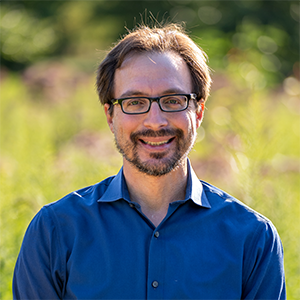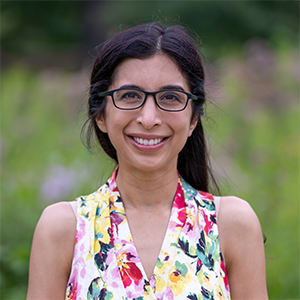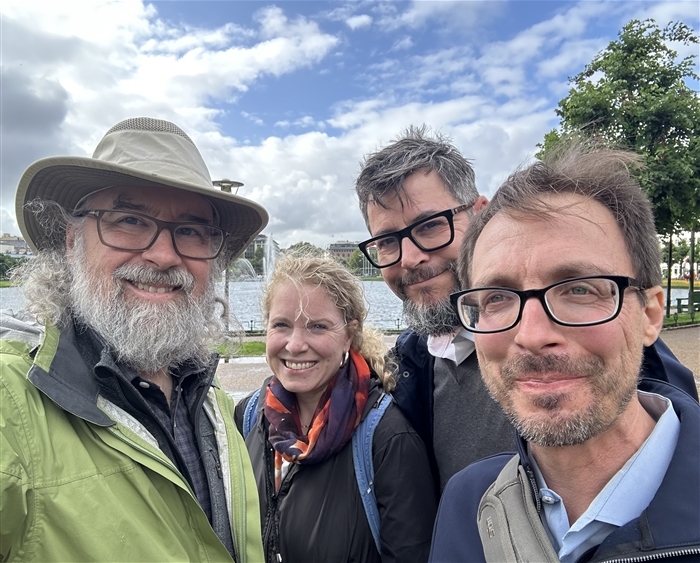Preparing college students for an AI-powered future

Artificial intelligence (AI) is shaping the future. Here's how we're preparing our students to succeed in a rapidly changing world.
When it comes to careers, the classroom, or even the consumption of digital content, AI is changing how people interact with the world.
Lake Forest College is preparing graduates to use AI ethically and effectively through:
- A new AI minor
- Classes that challenge students to use critical thinking skills around AI
- HUMAN grant initiatives
- Practical learning with AI

How is AI changing the future of the workforce?
In recent years, AI has touched every aspect of human life across a variety of industries, from healthcare and business to communication and entertainment. AI has been lauded for its potential to improve efficiency, reduce costs, and create new opportunities for growth.
As AI continues to evolve, it is reshaping the workforce, requiring new skills not only in employing AI in the service of efficiency, but also skills in facing the ethical challenges related to intellectual property and energy consumption that accompany AI use.
Students have the opportunity to not only present themselves as tech-savvy but also as skilled in navigating the complexities of AI.

“Interpersonal skills are going to become the singular most important thing to career and success as the cost of intelligence effectively drops to zero,” said Instructor in Philosophy and Politics Justin Kee. “The skills you learn at a small liberal arts college are working with people and navigating interpersonal dynamics that are not mediated through a screen.”

AI programs in colleges and universities
Lake Forest College has been at the forefront of college career preparation for over a decade. With ample opportunities for practical experiential learning, access to career-making internships, and guided mentorship through our nationally recognized career pathway program, the College is committed to preparing students for the future.
That's why Lake Forest College has introduced a first-of-its-kind AI minor with two tracks. This minor is combinable with any major, and students taking on a minor in AI in either track will have the opportunity to blend a variety of disciplines in their studies.
AI studies
Through the AI studies track, students explore how artificial intelligence is shaping the human experience through literature, ethics, history, and the arts. This humanities-driven track invites you to ask big questions about what it means to be human in the age of AI and offers practical skills for the 21st-century workplace.
AI governance
Through the AI governance track, students learn the processes, standards, and guardrails essential for ensuring that AI implementations are ethical, safe, and compliant. Through this minor, graduates become proficient in designing governance plans that cover the entire AI lifecycle, from proper launch and ongoing monitoring to issue resolution and sunsetting.
Lake Forest College is one of the first small liberal arts colleges to offer a comprehensive and interdisciplinary AI credential that is firmly rooted in the liberal arts tradition.
“I want our students to understand that AI refers to a collection of algorithmic-statistical methods that construct answers inferred from data (consequently highlighting how valuable data is!),” Jamshidi shared. “From this lens, students can better assess and understand the strengths and weaknesses of AI—which is key for using these methods in ways that advance the greater good of society.”

The minor program is designed to complement any major.
“You don't have to be a coder in order to play in the sandbox," Schneiderman said of gaining AI skills. “You need to know the right concepts and practical skills that come along with the liberal arts. You need to understand the ethics around AI so we don't get to a world where robots control everything. And we certainly need to pay attention to the current, real-world impacts of AI on humans and our environment.”
The HUMAN grant: The humanities and AI
Lake Forest College's Krebs Center for the Humanities is the convener of a $1.2 million grant from the Mellon Foundation for the HUMAN (Humanities Understanding of the Machine-Assisted Nexus) project.
HUMAN explores what it means to be human in the age of AI by engaging an interdisciplinary group of humanities faculty fellows who, in partnership with Chicago-based organizations, are developing:
- New courses that focus on AI
- Digital humanities research projects
- Seminars
- Publications
- Artist residencies
- And more
Students are gaining a broad understanding of the role that the humanities should play in public policy, cultural preservation, and community education in an AI-inflected world.
HUMAN addresses the urgent need for an informed understanding of the interplay between the humanities and the fast-evolving realm of artificial intelligence to ensure ethical developments, promote equitable technological advancement, and nurture meaningful human-AI collaboration.
HUMAN partners with the Chicago History Museum, Ragdale, Sweet Water Foundation, and works closely with the Center for Digital Narrative at the University of Bergen, Norway.

In the news: HUMAN team deepens partnership with University of Bergen’s Center for Digital Narrative
In early August, faculty leaders and administrators from Lake Forest College’s $1.2 million HUMAN grant from the Mellon Foundation traveled to the University of Bergen to collaborate with colleagues at the Center for Digital Narrative (CDN).
Practical learning with AI
The AI minor at Lake Forest College offers students a multitude of ways to engage with AI in a hands-on setting.
- Internships in AI-related fields
- Mentored research with faculty
- Partnerships with Chicago-based organizations
- Engage with real-world case studies across sectors such as healthcare, finance, and autonomous systems
- Review, assess, and draft governance frameworks for AI and data management systems
College courses on AI
Each year, HUMAN sponsors courses in the Lake Forest College curriculum that engage directly with issues of AI ethics. These courses explore the complex relationship between the humanistic tradition and artificial intelligence, focusing on how AI can exacerbate and mitigate existing social inequalities.
By integrating practical skills with ethical inquiry, students learn to critically analyze the social implications of AI technologies and consider how the humanities can help guide the ethical development and equitable advancement of AI.
Here are a few courses that examined and employed AI that were offered last year:
- FIYS 164: Archaeology of Chicago
- FIYS 189: Digital Dawn: Humanity, Cyberspace, and the Rise of Artificial Intelligence
- FIYS 191: Voices of Leadership
- COMM 371: Communication in the Age of AI
- ENGL 238: Literature/Culture in the Age of AI
- ES 326: Interrogating the Ecology of Place
- GSWS 224: AI, Robots, and Gender
- LING 300: Language Learning, Teaching, and AI
- PHIL 222: The Humanist Ethics of AI
- RELG 256: Religion, SciFi, AI, and Non-Human
- SPAN 385: Migration & AI in Spain/Latin America
“I want our students to leave college with very positive, beneficial view of artificial intelligence that will lead us to a future of abundance and vastly improved human standards of living,” Kee shared. “I have a positive view of the technology, and I think we are in a good direction with the technology. Our students understand the background and history of the technology they are working with, and they are also learning to use it.”
AI in the classroom
Understanding that all her students are likely going to encounter AI in professional contexts, Assistant Professor of Art History Kimiko Matsumura has been integrating exercises where students prompt AI to generate an art piece modeled after a certain period in art history. Students are then tasked with critiquing the generated image and analyzing societal assumptions about art period based on the inaccuracies in the image.

“I want my students to learn to be critical of AI generated outputs,” Matsumura said. “One thing important to me as an art historian is to be critical of visual communication in general. I want students to take those critical thinking skills and transfer them to whatever area they may encounter so they can be critical of evidence, tone, and word choice an AI model may present.”
AI and career preparation
On the career front, Assistant Vice President for Career Advancement and Director for the Gorter Family Career Advancement Center Colleen Monks is confident that AI is changing the job landscape for recent graduates.
“As AI is transforming how work is done across industries, skills like critical thinking, creativity, and communication are more essential than ever,” Monks shared. “In the Gorter Family Career Advancement Center, we are dedicated to ensuring our students stand out in this evolving landscape by understanding how to combine effective collaboration with AI and the vital humanistic skills that employers seek—skills that are deeply rooted in their liberal arts education.”
The need for an AI-prepared workforce, however, does not mean there is a need for more AI developers, Jamshidi explained: “The next generation of workers in this field won’t just be ‘AI developers’; they’ll be individuals who are competent enough to comprehend the entire lifecycle of AI systems (development, deployment, management, and sunsetting). In addition, they will need to understand which stakeholders are impacted by a system and how their feedback can be an ongoing element in a system’s design.”
Students like Gloria Nakafu ’27 are learning how to use AI in order to prepare themselves for the shifting landscape of future careers.
“I think it's really important for students to be engaging with AI because the fact of the matter is that it is a technology that's here, and there aren't really that many legislations around it yet, which hopefully will be something that will change in the future,” she shared. “Being able to use new technology makes you a better student and makes you more fit to take on new careers.”

